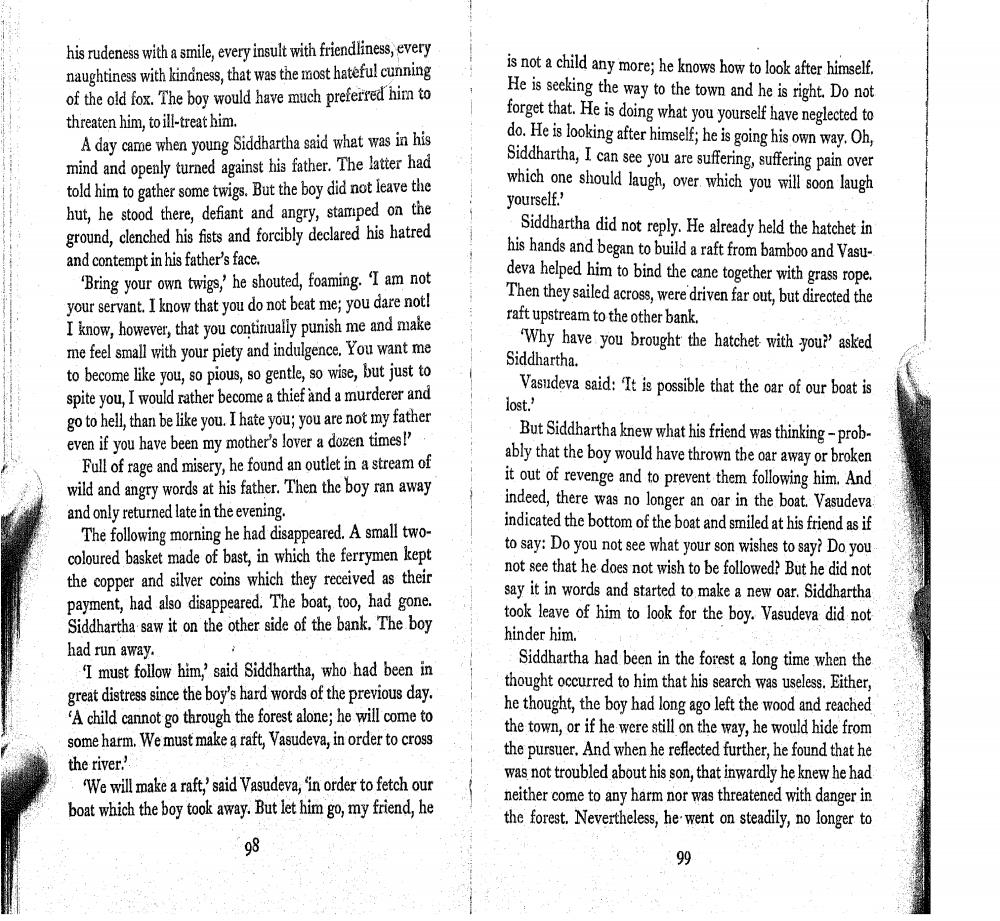________________
his rudeness with a smile, every insult with friendliness, every naughtiness with kindness, that was the most hateful cunning of the old fox. The boy would have much preferred him to threaten him, to ill-treat him.
A day came when young Siddhartha said what was in his mind and openly turned against his father. The latter had told him to gather some twigs. But the boy did not leave the hut, he stood there, defiant and angry, stamped on the ground, clenched his fists and forcibly declared his hatred and contempt in his father's face.
'Bring your own twigs,' he shouted, foaming. 'I am not your servant. I know that you do not beat me; you dare not! I know, however, that you continually punish me and make me feel small with your piety and indulgence. You want me to become like you, so pious, so gentle, so wise, but just to spite you, I would rather become a thief and a murderer and go to hell, than be like you. I hate you; you are not my father even if you have been my mother's lover a dozen times!"
Full of rage and misery, he found an outlet in a stream of wild and angry words at his father. Then the boy ran away and only returned late in the evening.
The following morning he had disappeared. A small twocoloured basket made of bast, in which the ferrymen kept the copper and silver coins which they received as their payment, had also disappeared. The boat, too, had gone. Siddhartha saw it on the other side of the bank. The boy had run away.
'I must follow him,' said Siddhartha, who had been in great distress since the boy's hard words of the previous day. 'A child cannot go through the forest alone; he will come to some harm. We must make a raft, Vasudeva, in order to cross the river.'
'We will make a raft,' said Vasudeva, "in order to fetch our boat which the boy took away. But let him go, my friend, he 98
is not a child any more; he knows how to look after himself. He is seeking the way to the town and he is right. Do not forget that. He is doing what you yourself have neglected to do. He is looking after himself; he is going his own way. Oh, Siddhartha, I can see you are suffering, suffering pain over which one should laugh, over which you will soon laugh yourself.'
Siddhartha did not reply. He already held the hatchet in his hands and began to build a raft from bamboo and Vasudeva helped him to bind the cane together with grass rope. Then they sailed across, were driven far out, but directed the raft upstream to the other bank.
'Why have you brought the hatchet with you?' asked Siddhartha.
Vasudeva said: 'It is possible that the oar of our boat is
lost.'
But Siddhartha knew what his friend was thinking - probably that the boy would have thrown the oar away or broken it out of revenge and to prevent them following him. And indeed, there was no longer an oar in the boat. Vasudeva indicated the bottom of the boat and smiled at his friend as if to say: Do you not see what your son wishes to say? Do you not see that he does not wish to be followed? But he did not say it in words and started to make a new oar. Siddhartha took leave of him to look for the boy. Vasudeva did not hinder him.
Siddhartha had been in the forest a long time when the thought occurred to him that his search was useless. Either, he thought, the boy had long ago left the wood and reached the town, or if he were still on the way, he would hide from the pursuer. And when he reflected further, he found that he was not troubled about his son, that inwardly he knew he had neither come to any harm nor was threatened with danger in the forest. Nevertheless, he went on steadily, no longer to
99




